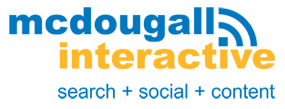
 John McDougall: Welcome to the Authority Marketing Roadmap brought to you by workingdemosite.com/authority. Position yourself as an expert. I’m John McDougall, and I’m here to today with Dan Janal, who was one of the founding fathers of Internet marketing and publicity. He wrote one of the first books on Web marketing in 1993, back when Al Gore and Dan were one of the few people online. [laughs]
John McDougall: Welcome to the Authority Marketing Roadmap brought to you by workingdemosite.com/authority. Position yourself as an expert. I’m John McDougall, and I’m here to today with Dan Janal, who was one of the founding fathers of Internet marketing and publicity. He wrote one of the first books on Web marketing in 1993, back when Al Gore and Dan were one of the few people online. [laughs]
 Dan Janal: It was early days. Early days. Good times. Good times. [laughs]
Dan Janal: It was early days. Early days. Good times. Good times. [laughs]
Authorship, Thought Leadership, & Media Appearances
 John: Dan, how important is being an author to being a thought leader and getting media appearances?
John: Dan, how important is being an author to being a thought leader and getting media appearances?
 Dan: It really is critical. Having a book immediately positions you as an expert. Reporters want to minimize their downside whenever they talk to an authority. Whenever they’re writing an article, they want to make sure they’re talking to the right person that has the credibility and won’t embarrass them, frankly.
Dan: It really is critical. Having a book immediately positions you as an expert. Reporters want to minimize their downside whenever they talk to an authority. Whenever they’re writing an article, they want to make sure they’re talking to the right person that has the credibility and won’t embarrass them, frankly.
If you say that you’ve written a book, then that helps to make the reporter very happy and decrease any fears that they might have that you might not be a true expert. Having the book really brands you in a way that very few other things can. It makes you an authority.
Tips for Writing Your First Book
 John: What are some tips to getting your first book written?
John: What are some tips to getting your first book written?
 Dan: Well, everyone has different modalities. Frankly, it’s never been easier to write a book these days so that’s the good news. First of all, you need content. A lot of people are comfortable writing, so I suggest you write a blog every day. Put another post for every day for — in 360 days, you’ll have a book.
Dan: Well, everyone has different modalities. Frankly, it’s never been easier to write a book these days so that’s the good news. First of all, you need content. A lot of people are comfortable writing, so I suggest you write a blog every day. Put another post for every day for — in 360 days, you’ll have a book.
Or, if you have longer pieces, then maybe after a couple of months, you’ll have a book. But the idea is that every Monday you have your newsletter go out or have your blog go out. That’s one way.
Number two, you can do what we’re doing here, doing podcasting. Interview guests, interview famous people, and then turn those interviews into podcasts or into transcripts and put those into your book.
You may even use them in a Q&A format. I wrote a book exactly like that, with strictly Q&A with a little bit of overview. Don’t make this hard on yourself. People want information. They want to be able to access it easily, so make it easy. Those are two quick ways.
 John: I think you were telling me that you made an email program where people would get tips in email and you were able to repurpose that and do a book as well, or vice versa.
John: I think you were telling me that you made an email program where people would get tips in email and you were able to repurpose that and do a book as well, or vice versa.
 Dan: Yeah, my book called “Reporters Are Looking for You.” It’s really a collection of my training. As a service provider, we want our users to consume our products. Sometimes, we have to teach them how to use our product effectively. It’s like Word. There are 900 things you can do in Word and most people use eight things of them. They don’t even know that the other 800…well, they know the other 800 exists. They don’t know why they exist. For my PRLeads service, I had a 90‑day training program. Every day, I would email them another tip on how to talk to media or how to write for the media or how to position themselves, things that would make them better in a PR world.
Dan: Yeah, my book called “Reporters Are Looking for You.” It’s really a collection of my training. As a service provider, we want our users to consume our products. Sometimes, we have to teach them how to use our product effectively. It’s like Word. There are 900 things you can do in Word and most people use eight things of them. They don’t even know that the other 800…well, they know the other 800 exists. They don’t know why they exist. For my PRLeads service, I had a 90‑day training program. Every day, I would email them another tip on how to talk to media or how to write for the media or how to position themselves, things that would make them better in a PR world.
It’s a lot to absorb. I didn’t want to give everyone all the information at once because it would just be information overload. Every day, I would send them another email. This was on an automated program. They’d get a tip on how to do publicity better. Well, I took those 90 tips and I turned them into an e‑book. I transcribed them. I put them in the right order. A little bit of organization here, here’s media training, here’s media outreach, here’s what to do with your publicity, here’s how to use your publicity in marketing, so it made nice little sections there. But it was really all my original lessons with slight rewriting for the format and the style, but it was great content.
It’s helped a lot of people. Now, I have an e‑book. Well, it is an e‑book, but it’s also a paperback book that I published with CreateSpace, which is another great way to publish a book for like two and half dollars. It’s available on Amazon. They took care of all the distribution, the ISBN numbers, and it’s easily found now on Amazon because it’s a book and it’s an e‑book. Publishing has never been easier.
Ghost Writing: Pros and Cons
 John: Absolutely. What are some ways to utilize ghost writing, or some pros and cons of ghost writing?
John: Absolutely. What are some ways to utilize ghost writing, or some pros and cons of ghost writing?
 Dan: Well, a lot of people don’t like to write. [laughs] It is a skill. I was a daily newspaper reporter and editor for many years. Then, I went into PR and I’ve written six books that have been translated into six languages. I think with my fingers. You put my fingers on a keyboard and I fly away. It’s direct from brain to fingertips. I can get the message out.
Dan: Well, a lot of people don’t like to write. [laughs] It is a skill. I was a daily newspaper reporter and editor for many years. Then, I went into PR and I’ve written six books that have been translated into six languages. I think with my fingers. You put my fingers on a keyboard and I fly away. It’s direct from brain to fingertips. I can get the message out.
I know other people who they look at a blank page and they’re like, “Oh my gosh, what am I going to do?” But these people are great at what they do. They may be leading seminars on networking or referral marketing. They might be realtors who could earn a whole lot more doing a big deal than by sitting down writing a book.
For those kinds of people, it’s probably a better idea to work with a ghost writer so you can go off and make your big bucks doing what you’re doing and have someone else, who’s an expert in writing, take care of your thoughts and your ideas and put them on paper so you can use the book to build your authority even more.
 John: What are some of the risks, if someone’s not committed? The ghost writer isn’t committed to your mission and your tone of voice. Is that a problem? Is there a way to correct that?
John: What are some of the risks, if someone’s not committed? The ghost writer isn’t committed to your mission and your tone of voice. Is that a problem? Is there a way to correct that?
 Dan: That would definitely be a problem [laughter].
Dan: That would definitely be a problem [laughter].
You could send that off easily in the hiring process. Read works that they have done. Do you like their style? Do you like their tone when they write? Do they get your stuff? Do they understand your material? I mean, granted, they may not understand physics the way you do, in which case they should probably not be the right person to hire.
Also, do you get along with them personally? Is this someone that you can talk to, that you can bounce ideas off of, that you feel energized? Do you feel that they get it? Or, is there just a total disconnect? It’s like a pair of shoes. If they don’t fit in the store, it’s not going to get better a week later.
Does having a book help you get speaking engagements?
 John: Nice. That’s a good tip. What about the idea of a book enabling you to get speaking engagements? Does it help? How much does it help to get speaking engagements?
John: Nice. That’s a good tip. What about the idea of a book enabling you to get speaking engagements? Does it help? How much does it help to get speaking engagements?
 Dan: A book definitely helps you get speaking engagements, because meeting planners want authorities and, by having a book, that means that you’re an authority. Also, let’s face it, there are a lot of people who do what you do, whether you’re a doctor or a lawyer or a chiropractor or a salesperson or whatever. You’ve done wonderful things — so have they.
Dan: A book definitely helps you get speaking engagements, because meeting planners want authorities and, by having a book, that means that you’re an authority. Also, let’s face it, there are a lot of people who do what you do, whether you’re a doctor or a lawyer or a chiropractor or a salesperson or whatever. You’ve done wonderful things — so have they.
What makes you stand out? The fact that you’ve written a book and they haven’t. That may be the one factor that means that you get the speaking engagement. When you’re in front of the audience, you’re building your credibility, you’re meeting more people, you’re adding more people to your mailing list, you’re making more contacts, you’re networking and all good things happen from that.
You do want to get those speaking engagements and the book can help you get that speaking engagement. Also, after it’s over, you have a book to sell or to use as a big business card and give it away to people who you think would be good prospects for you.
Speaking Engagements and Press Releases
 John: Do you think, when you have speaking engagements, should you do a press release about the speaking engagement? Or, is that too little information for press release?
John: Do you think, when you have speaking engagements, should you do a press release about the speaking engagement? Or, is that too little information for press release?
 Dan: No, press releases are great because, frankly, people go to conventions based on the content and the people who are going to be speaking. If you know that President Clinton is going to be at a conference and you’re like, “Oh wow, that sounds pretty cool. I think I’ll go there,” it gives instant credibility to that conference as well. Well, President Clinton is not listening to this podcast, I don’t think, but you are.
Dan: No, press releases are great because, frankly, people go to conventions based on the content and the people who are going to be speaking. If you know that President Clinton is going to be at a conference and you’re like, “Oh wow, that sounds pretty cool. I think I’ll go there,” it gives instant credibility to that conference as well. Well, President Clinton is not listening to this podcast, I don’t think, but you are.
You may be a bigger name in your field than you may think. You could be attracting people. I spoke at a conference recently and, as I was leaving, this woman ran up to me and said, “You don’t know me, but I’ve been on your mailing list for 12 years and when I saw that you were going to be speaking at this conference, I got really, really excited.”
So, we are celebrities in our own field. We’re not Madonna. We’re not Kim Kardashian. We never will be. But in our own niches, we are famous. By having the book out there, that makes you even more famous. People will want to come to see you speak, even though your next door neighbor doesn’t have the slightest idea what you do.
A press release could definitely help gets butts into seats. You’ll help the meeting planner, the convention planner. You’ll be a hero for them as well. Plus, it gives you another imprint on Google, so it expands your digital footprint on the Internet. You can’t go wrong with a press release. You can’t go wrong with a book.
 John: Absolutely. Those are some great tips, Dan. Thanks for listening to Authority Marketing Roadmap. You can find us at workingdemosite.com/authority. Make sure you subscribe to our podcast on iTunes. Authority Marketing ‑‑ Position Yourself as an Expert. Have a great day.
John: Absolutely. Those are some great tips, Dan. Thanks for listening to Authority Marketing Roadmap. You can find us at workingdemosite.com/authority. Make sure you subscribe to our podcast on iTunes. Authority Marketing ‑‑ Position Yourself as an Expert. Have a great day.
